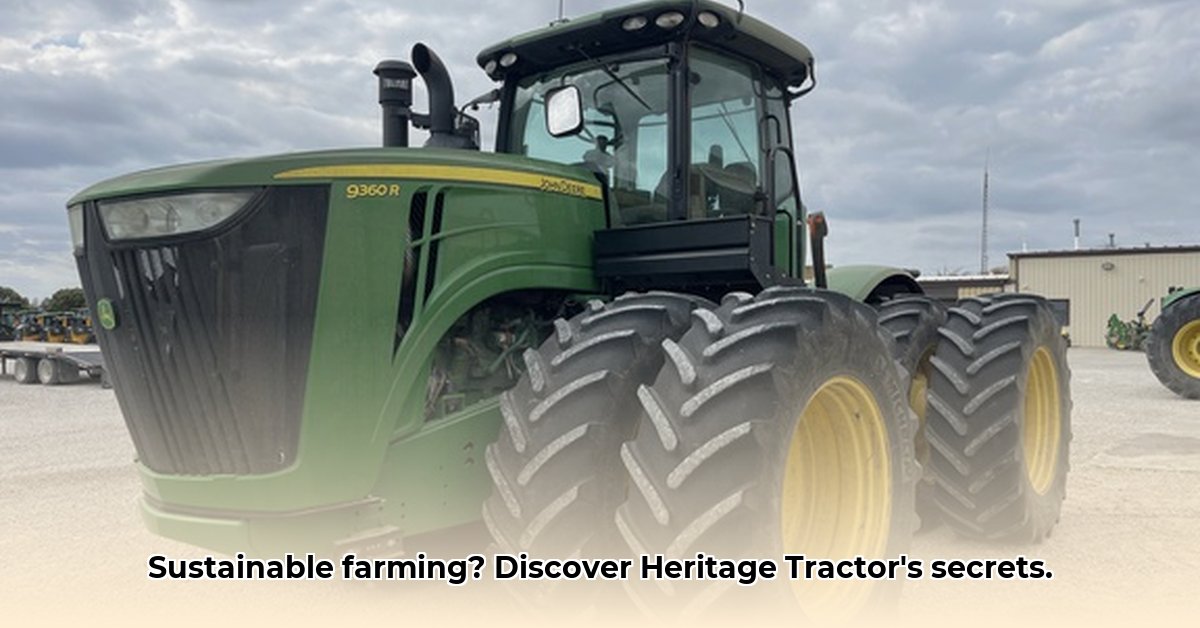
Heritage Tractor in Olathe, Kansas, is more than just a farm equipment dealer; it's quietly becoming a key player in the sustainable agriculture movement. While their current success stems from servicing landscaping equipment, their potential for growth within the sustainable farming sector is significant. This article explores their current approach, identifies key opportunities for growth, and charts a course toward a more sustainable future for both Heritage Tractor and the Olathe farming community. For another example of success in sustainable agriculture equipment, check out Heritage Tractor Westphalia.
From Lawns to Farms: A Strategic Pivot
Heritage Tractor's existing strength lies in its rapid parts sourcing and reliable on-site maintenance – crucial for smaller farms and those focused on sustainable practices where quick solutions are essential for maintaining operational efficiency. This readily available support perfectly aligns with the demands of modern sustainable farming, making them a valuable resource for local farmers. However, their current marketing primarily focuses on homeowners and landscaping businesses, leaving a large untapped market of larger-scale sustainable farms. This presents a considerable opportunity for growth. How can Heritage Tractor best leverage its existing strengths to expand into this crucial market segment?
A Pivotal Opportunity: Currently, Heritage Tractor’s marketing efforts are primarily directed towards homeowners and landscapers. This leaves a significant portion of the Olathe farming community – especially those focused on sustainable practices – untapped. Seizing this opportunity represents a significant potential for growth and market share expansion.
Planting the Seeds for Growth: A Strategic Plan
To fully capitalize on the sustainable agriculture market, Heritage Tractor requires a comprehensive, multi-faceted strategy. This strategy focuses on building stronger relationships with farmers, providing tailored solutions, and establishing itself as a trusted partner in the Olathe farming community.
Targeted Marketing: Shifting marketing efforts from homeowner-focused publications to sustainable farming publications, attending agricultural conferences, and sponsoring farm-related events will directly reach the target audience. This strategy offers a higher return on investment by focusing resources on prospects directly involved in sustainable agriculture.
Strategic Partnerships: Building relationships with local farmers and agricultural organizations will provide valuable market insights while simultaneously offering farmers access to reliable equipment maintenance and support. This mutually beneficial approach fosters long-term loyalty and sustainability.
Inventory Expansion: Expanding the inventory to include specialized equipment for sustainable practices, such as precision farming tools, water-efficient irrigation systems, or renewable energy solutions, will differentiate Heritage Tractor from competitors and position it as a leader in sustainable ag-tech. This diversification directly addresses the needs of sustainable farmers and strengthens their market position.
Sustainability-Focused Sourcing: Exploring environmentally responsible sourcing for parts and materials will build trust with consumers and enhance the company's brand image. This demonstrates a commitment to sustainability that extends beyond customer-facing activities.
Community Education: Investing in educational programs that highlight sustainable farming techniques and suitable equipment will strengthen Heritage Tractor's position as a valuable resource and trusted advisor. This builds long-term loyalty and positions them as thought leaders in the community.
Weeding Out Challenges: Addressing Obstacles to Growth
Despite the potential, Heritage Tractor faces challenges common to the agricultural sector. These include intense competition, regulatory changes, supply chain disruptions, and the need to encourage farmer adoption of new technologies. Addressing these challenges requires a proactive and adaptive approach.
Competition: Heritage Tractor can mitigate intense competition by focusing on niche markets within sustainable agriculture, providing exceptional customer service, and building strong customer relationships.
Supply Chain Issues: Diversifying suppliers, exploring local sourcing, and strengthening existing relationships will help to ensure a consistent supply of parts and materials. Building inventory buffers for critical parts will also mitigate disruption.
Reaping the Rewards: A Sustainable Future for Heritage Tractor
Heritage Tractor possesses a strong foundation for success in the sustainable agriculture sector. By implementing the strategic steps outlined above and effectively managing the challenges, they can build a thriving business while contributing significantly to a more sustainable future for Olathe farmers. The potential for growth is immense, and with a concerted effort, Heritage Tractor can establish itself as a leader in sustainable agriculture within the Olathe community and beyond.